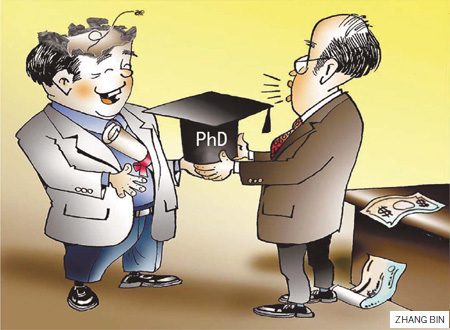Behind the fancy foreign diplomas
Tang, who is featured on the Caixin list, was unavailable to comment when contacted by China Daily.
"Some people have an obsession with decorating their fancy offices with framed diplomas of Western universities. They don't care if it's fake," said Sang Peng, director of the Beijing Overseas Study Service Association and a former official with the capital's education commission.
He said vainglorious businessmen are the main customers for diploma mills.
In 2000, when Sang was still with the commission, he was part of an operation to snare the organizers of a school hawking fake diplomas in the capital.
After paying more than 100,000 yuan ($14,700) and taking a few weekend "lectures", dozens of "students" were promised PhDs in business administration from a university in the US. (Sang could not remember the name of the school.)
"Both the organizers and the students knew the certificates would be fake," he said. "They just wanted to add PhD to their names, to go alongside their CEOs or CFOs. Some of them didn't even speak English."
Diploma mills are legally registered institutes but are not acknowledged by any countries' ministry of educations or professional diploma verification groups, added Sang. In the US, accredited universities do not accept academic credits of students from these mills and their diplomas cannot be used as proofs when seeking higher education.
To attract Chinese customers, diploma mills usually found agencies in China "but in most cases they don't even have an office", said Sang. "Just one Chinese worker hawks the diploma in business meetings or on the Internet."
He said such colleges usually use misleading words in their names, like "international," "ivy" or "Pacific." "They use people's ignorance of Western education to their advantage," said the association director.
More often than not, say experts, diploma mills are Web-based firms that promise potential customers that they can earn the credentials quickly. To look more convincing, they often copy the design of genuine universities' websites, and some even ask applicants to pass an easy test or produce a short essay.
However, the majority will also happily sell diplomas directly. At szbzxun.com, a website that sells fake diplomas, it clearly states that as long as customers pay 30 percent of the "study fees" and hand over their personal information and the names of the universities they want the diploma from, they can receive an e-diplomas in just two days.
If the customer is satisfied with the sample and pays the rest of the money, the diploma can be printed and mailed in roughly a week, it says on the website.
Huashang Daily, a Shaanxi-based newspaper, reported that as well as fake certificates, some companies also provide fake exam scores, letters of recommendation and diploma certificate verification.
 0
0 








Go to Forum >>0 Comments